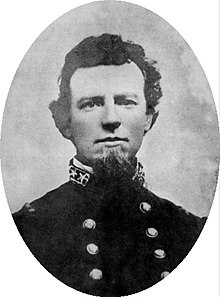15th (Northwest) Arkansas Infantry Regiment
Bastion Whitehurst Cox, raised from the 10th Regiment, Arkansas State Militia, of Johnson Country was also assigned to Lt Col McRea's battalion during the Wilson's Creek Campaign.
[3] The unit took an active part in the battles at Wilson's Creek on August 10, 1861,[1] then marched to Camp Jackson, Arkansas, and where it was stationed and continued to drill from September 1, 1861, until the middle of October 1861.
[4] In November 1861, four new companies from Benton, Pope and Washington counties joined the 3rd Arkansas Battalion, making a total of eight, so Brigadier General McCulloch asked the Confederate War Department to authorize the battalion to be designated as a regiment, promising that the last two companies would shortly be added.
[2] The unit went into winter quarters at Cross Hollows, in Benton County Arkansas, where it remained there until February 20, 1862. went it was ordered to Sugar Creek, Missouri, with the rest the army and formed a junction with General Price's forces.
The unit remained in the mountains until March 3 when it began the movement to attack the Union forces at the Battle of Pea Ridge.
[6] All twelve-month regiments had to re-muster and enlist for two additional years or the duration of the war; a new election of officers was ordered; and men who were exempted from service by age or other reasons under the Conscription Act were allowed to take a discharge and go home.
[9] The Northwest) Regiment sustained 82 casualties at the Battle of Port Gibson and was eventually forced to endure the siege of Vicksburg from May 18 on July 4, 1863.
[3] General U. S. Grant initially demanded the conditional[verification needed] surrender of the Vicksburg garrison, but faced with the necessity of feeding 30,000 starving Confederates and having the idea that these soldiers might do more harm to the Confederate cause by being released to return home rather than being exchanged as whole units, he relented and allowed for the immediate parole of the unit.
The able bodied Confederate soldiers who were released on parole walked out of Vicksburg (they were not allowed to proceed in any military formations) on July 11, 1863.
Paroling of these able bodied men was completed in their respective regimental camps inside Vicksburg prior to the July 11th.
Some of the most seriously wounded and sick were sent by steamship down the Mississippi River and over to Mobile, Alabama, where they were delivered on parole to Confederate authorities.
Most of the Arkansas units appeared to have bypassed the established parole camps, and possibly with the support or at least by the compliancy of their Union captors, simply crossed the river and returned home.
Because so many of the Vicksburg parolees, especially from Arkansas, simply went home, Major General Pemberton requested Confederate President Davis to grant the men a thirty- to sixty-day furlough.
[12] The furloughs were not strictly adhered to so long as the soldier eventually showed up at a parole camp to be declared exchanged and returned to duty.
Historians can find no record of the parolees from this regiment reporting to the established parole camps at Enterprise or Demopolis, Mississippi.
[verification needed] The regiment was eventually reorganized west of the Mississippi at Washington, Arkansas, but there are no muster rolls available to indicate how men reported for duty.
[14] Major-General Earl Van Dorn adopted this flag design for the Army of the West in February 1862, citing confusion with the Stars and Stripes.

